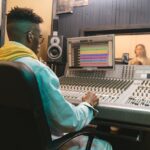What is synchronization or sync licensing, you ask? The answer can be complex but is ultimately quite simple.
“Synchronization” is when music and moving images are used simultaneously in television shows, commercials, movies, advertisements, video games, YouTube videos, or other applications.
A music “synchronization license,” or “sync,” for short, is a music license granted by the copyright holder of a particular composition, allowing the user to synchronize music with visual media. When a composition is licensed for sync, the songwriter and publisher receive a fee for the use of the underlying song. Likewise, the owner of the sound recording will also receive a master use license fee.
Benefits of a Sync Licensing
With all the other types of royalties available to artists, you may wonder what the benefits of sync licensing are. Getting sync licenses can have a significant impact on your career. With sync, you can align yourself with a particular product or brand. Imagine if every time someone saw a packet of Juicy Fruit gum, your song popped into the consumer’s head. If people like what they hear in commercials, they’re likely to look up the artist and possibly become a fan of yours.
Sync licensing generates royalties. The amount of money each sync license pays depends on a set of factors. These factors include:
Visual Media Type: The type of visual media—from a video on Facebook to a blockbuster movie
Duration: Will it be used one-time or in-perpetuity?
Budget: Small to large scale production budgets—from zero to millions
Territory: Domestic, foreign, or both?
Popularity: The demand for the song and artist
Length: The length of the audio segment synchronized
Usage: The nature of the sync—from opening credits to a theme song
How Music Sync Licensing Works
An important thing to note is that music supervisors use metatags like genre, mood, tempo, etc. to search for music. As an artist, it is essential to work closely with your record label and distributor to properly designate those tags so that your works are found more easily.
Two criteria must be met when a song is synchronized with visual content. The first is that the music must be an optimum fit for the content, and the second is that the license must be within budget and acquired on time. Often, these are determined by a music supervisor.
The Music Supervisor
Music supervisors make sure that both criteria are met. Supervisors also do the legwork when it comes to finding music. For example, a movie producer might request a specific type of music, “find me a song that fits this romantic scene.” The music supervision team searches for a selection of songs to choose from that fulfill the scene’s mood and objective. Music supervisors act as liaisons between artists and the users. They ultimately will execute a sync license for the work.
An important thing to note is that music supervisors use metatags like genre, mood, tempo, etc. to search for music. As an artist, it is essential to work closely with your record label and distributor to properly designate those tags so that your works are found more easily.
Sometimes, a producer wants a well-known artist or song for their product, but the production budget cannot cover the cost. In that case, the music supervisor might search for a lesser-known artist covering the exact composition or a different song embodying the same feel. These cases present an excellent opportunity for lesser-known, independent artists to license their works for production.

The Music License: Publishing and Master Rights
Once a composition is identified for a production, the licensing process begins. There are two key rights for every sync license: the publishing license and the master recording license. The publishing right denotes the underlying composition (notes and lyrics), while the master recording right refers to the actual sound recording (the master). Both licenses are required, which often means multiple parties will be involved to license the composition and master successfully.
However, in some cases, one individual or entity (a songwriter or recording artist) owns 100% of both the publishing and recording rights. In this instance, the sync is considered a “one-stop” license. Music supervisors often view one-stop licenses favorably because they are far easier to execute and often more cost-effective to license.
Sync Your Money, Don’t Sink It!
A synchronization license deal is a perfect opportunity for any artist, no matter how big, small, new, or established you are. You can earn a flat fee and sometimes reoccurring royalties every time your music is broadcasted with a sync license!









